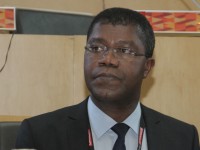
Science, Technology, Engineering and Mathematics (STEM) subjects are “powerful forces for progress in global society”, underpinning “most of modern life”. This is the philosophy behind AIMS, the African Institute for Mathematical Sciences, a network of centres of excellence that promotes STEM at the school and university levels, building indigenous capacity in these crucial subjects. A truly pan-African organisation, AIMS has centres in South Africa, Senegal, Ghana, Cameroon, and Tanzania, and many of its graduates go on to teach in universities from Zambia to Sudan. Thierry Zumahoun, President and CEO of the AIMS Global Secretariat, talked to the eLearning Africa News Service about the Institute’s work and goals.
Zumahoun is a familiar face at eLearning Africa, having participated in the 2015 debate, arguing passionately the importance of higher education vs. vocational training. At AIMS, he has presided over the growth of the network across Africa and initiated the Next Einstein Forum, aiming to make Africa “the next hub for global science, innovation, and youth entrepreneurship”. His colleagues and he believe that “the next Einstein will be African” – and that “she or he will develop solutions that cross borders and change lives.”
The importance of STEM for African development is clear to Zumahoun. “STEM … is vital to the future of Africa,” he says. It “shapes professionals who build communities and transform nations. These professionals solve complex global problems. They work to find solutions for climate change, cancer, hunger, disappearing habitats, and an interdependent world economy.”
AIMS’ post-graduate programme brings students from all over Africa together with world-class teachers, lecturers and tutors. Five hundred students have graduated so far from 35 African countries. However, there are significant obstacles to progress in STEM that Zumahoun feels must be addressed: problems of “geographical and professional isolation”, problems of a lack of funding or unequal access to education, and a need for “higher salaries, a better public image, and more mentors for African scientists”.
There is also a need to reform the way STEM is taught. It starts, Zumahoun says, in secondary school. “We need higher numbers of secondary school teachers and mathematicians and scientists at the master’s and PhD levels,” he says. “With few professors to train the next generation of leaders, countries cannot meet the growing demand for STEM professionals with up-to-date advanced training.”
“Engaged and enthusiastic teachers” will produce engaged and enthusiastic students, planting the “seed of interest” that leads to further discovery. “Students in Africa’s educational systems, as well as future generations, must understand and embrace the technology that affects them every day,” says Zumahoun.
AIMS is also committed to engaging more women in STEM. This year, 20 of the 49 students registered for the Master’s in Mathematical Sciences are women. “Given the transformative power of STEM,” Zumahoun points out, “it is important that our young women are actively encouraged to take an interest in STEM education. To do this, we need to equip our teachers with skills and knowledge on how to engage girls and encourage our families and communities to help both girls and boys believe in their capabilities.”
Reducing inequalities such as these is a key theme of the 2030 Sustainable Development agenda – an agenda in which STEM could play a large role. Zumahoun elaborates, “Achieving the goals for education will provide the resources to reduce poverty, to improve health, and to reach inclusive growth that lessens inequality within and between countries.”
Greater private and public investment in STEM will empower Africans to apply their knowledge to problems they face – something AIMS places at the heart of its teaching.” AIMS graduates are trained to be entrepreneurs and apply solutions to community challenges,” says Zumahoun. Seventy percent of these graduates remain on the Continent, in universities, or private companies, working in ICT, finance, and health.
These are some of the “next generation of leaders” – and the next Einstein may well be among them.
Thierry Zumahoun will be a keynote speaker at eLearning Africa 2016, to take place in Cairo, Egypt, May 24-26. For more information on all of the conference speakers, please visit the programme page.


















